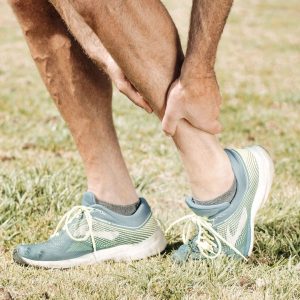Achilles Tendonitis and Running: Recovery and Prevention
 With each step you take, your Achilles tendon is at work. The Achilles tendon, also known as the heel cord, is the thick and fibrous band of tissue that connects the calf muscles to the heel bone. It is the strongest tendon in the body, and it allows us to push off the ground when walking, running, and jumping. Because we use the Achilles tendon so often, it’s at risk for the overuse injury known as Achilles tendonitis. People who put this tendon to work more often, like runners, are especially vulnerable to this injury.
With each step you take, your Achilles tendon is at work. The Achilles tendon, also known as the heel cord, is the thick and fibrous band of tissue that connects the calf muscles to the heel bone. It is the strongest tendon in the body, and it allows us to push off the ground when walking, running, and jumping. Because we use the Achilles tendon so often, it’s at risk for the overuse injury known as Achilles tendonitis. People who put this tendon to work more often, like runners, are especially vulnerable to this injury.
Today, Orthopaedic Hospital of Wisconsin physical therapist Melissa Post, PT, DPT, TPS, of Wauwatosa Physical Therapy explains Achilles tendonitis and what we know about preventing and treating this injury. Post provides practical tips and guidance on when to seek professional treatment.
How Does Achilles Tendonitis Happen?
Achilles tendonitis is a common injury often associated with running or other sports that involve lunging and jumping. Oftentimes people with Achilles tendonitis experience pain and swelling in the tendon. For some, stiffness in the ankle can also occur. This can be painful and debilitating and may lead to a chronic condition that may require surgery to repair. This is why it’s important to engage in preventative measures to avoid overuse.
For runners preparing for a big race, it can be easy to overuse your achilles tendon while training. Perhaps you’ve started running for much longer or begun to push yourself to go at a faster pace than you are used to. Without gradually increasing your speed and duration, you put yourself at risk for an overuse injury.
Additionally, the Achilles tendon tends to weaken with age. This weakness can put you at risk for an overuse injury, especially if you enjoy doing sports sparingly or suddenly increase your activity level one day. There are additional risk factors, such as certain medical conditions and medications, that can make you more susceptible to an Achilles tendon injury. For example, people with a naturally flat foot arch, people who are obese, and people who have high blood pressure are at a much higher risk for an Achilles injury. It’s best to check with your doctor to better understand what risk factors might be at play for you.
Tips for Preventing Achilles Tendonitis
Achilles Tendonitis can oftentimes be prevented with a little self-care by bringing awareness to the impact the activities you engage in have on your body. A few simple tips can help you to prevent a painful injury while running.
-
 Don’t overdo it
Don’t overdo it
Perhaps the most simple but most important tip is to not overdo it when it comes to running. While you may feel it’s important to push yourself, it’s also important to begin slowly and gradually push yourself. Remember to also have a warm-up routine you incorporate before running that can help prepare your body for the activity ahead.
-
Come prepared for your run
In addition to a running warm-up routine, it’s also important to arrive prepared for your run with proper footwear. Your shoes should provide adequate support and heel cushioning that make the impact on your feet and ankles as low as possible. If your shoes are of good quality, but still do not feel supportive, you may benefit from foot orthotics that provide extra support.
If running outside, be sure to be aware of your surroundings. You are at a much higher risk for an Achilles injury in hilly terrain and cold weather. A simple check of the day’s weather before your run can help you to dress properly and avoid putting yourself at risk if there are icy conditions. And if you plan to run in a new area, it’s important to research the terrain beforehand. Ensure the terrain is not too steep and treacherous to avoid overextending your Achilles tendon.
-
Don’t just run
Do stretches and stretching exercises. Include low-impact exercises into your routine that give your Achilles a break.
Treating Achilles Tendonitis
Treatment for Achilles tendonitis may involve physical therapy, exercise, shoe orthotics, ultrasound, electrical stimulation, injections, shockwave therapy, low-level laser therapy, anti-inflammatory medications, and surgery. Your doctor will help you determine the best course of treatment for your pain.
Physical Therapy for Achilles Tendonitis
Physical therapy is a helpful option for Achilles Tendonitis. The early stages of therapy will help reduce swelling and help the injured area heal. Physical therapists use a variety of treatments to help the pain and reduce tendon overload during daily activities. Ice is often recommended after activity to decrease pain. Other treatments might include custom orthotics, heel lifts, manual therapy, iontophoresis, taping, dry needling, or modalities.
Research has shown exercise is very effective at helping Achilles Tendonitis. A physical therapist has specific training to help select the best exercises to restore pain-free movement and activity. Exercises for Achilles tendonitis should address your ankle mobility, stability, and strength.
As symptoms reduce, physical therapists can help you improve specific tasks, movements, and body mechanics. Physical therapists use gait analysis to assess walking and running patterns for any potential issues. Return to sport tests can be used to see if you are ready to resume running. Physical therapists can help design return to running guidelines for you. Keep in mind that this will take time and you are most likely going to avoid further injury by following a specific return to a running program.
Recovering from Achilles Tendonitis
Recovery from Achilles tendonitis can take time. Several months is common, sometimes even up to a year for a full recovery. As always, you have to listen to your body when you exercise. Good recovery will involve gradually improving mobility and carefully adding load to the painful side over time. Higher impact activity should be limited until you are cleared by your doctor or physical therapist. Training should be advanced carefully to protect the Achilles tendon while it heals. If you are suffering from the symptoms of Achilles tendonitis or any other orthopedic issue, make an appointment with our team of orthopedic specialists today.

